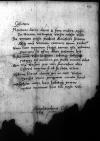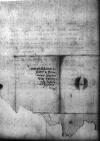List #3025
UNKNOWN do Ioannes DANTISCUSs.l., [1546/1547, after 1546-09-25]
Rękopiśmienne podstawy źródłowe:
| ||||
Tekst + aparat krytyczny + komentarzZwykły tekstTekst + komentarzTekst + aparat krytyczny
R paper damaged⌈[R]R paper damaged⌉everendissimo in Christo paper damaged⌈[Christo]Christo paper damaged⌉ Patri et Domino paper damaged⌈[no]no paper damaged⌉ Do paper damaged⌈[Do]Do paper damaged⌉mino
Salutem.
Maecenas ms. Moecenas(!)
⌈MaecenasMaecenas ms. Moecenas(!)
⌉, doctis decus et fons inclite
En iterum incomptos versus adesse vides.
Da veniam quaeso: puduit dimittere servum
Absque meo vacuum carmine. Nonne probas?
Nam licet ingenium friget tamen ipsa voluntas
Prompta sit officii docte patrone loco.
Destituunt vires linguam roburque fathisci overwritten⌈ii overwritten⌉t,
Integer est animus, qui
cf. Hor. Epist. 17, 164 Vela quidem Creten ventis dedit ille secundis / sed tu non ideo cuncta licere puta! ⌊puta cuncta volatcf. Hor. Epist. 17, 164 Vela quidem Creten ventis dedit ille secundis / sed tu non ideo cuncta licere puta! ⌋
Qui vix
Cesserit ingenio si id quoque fata velint
Aldina fuerat clarus qui in arte
Excessit vivis pi{n}gnora cuncta simul
Musophilos inter Lares habitoque priores
Mittit Maecenas ms. Moecenas(!)
⌈MaecenasMaecenas ms. Moecenas(!)
⌉ hinc tibi Musa vale.
Amplitudinis Celsitudin paper damaged⌈[udin]udin paper damaged⌉isque paper damaged⌈[ue]ue paper damaged⌉ tuae [...] paper damaged⌈[...][...] paper damaged⌉


 BCz, 1598, p. 608
BCz, 1598, p. 608